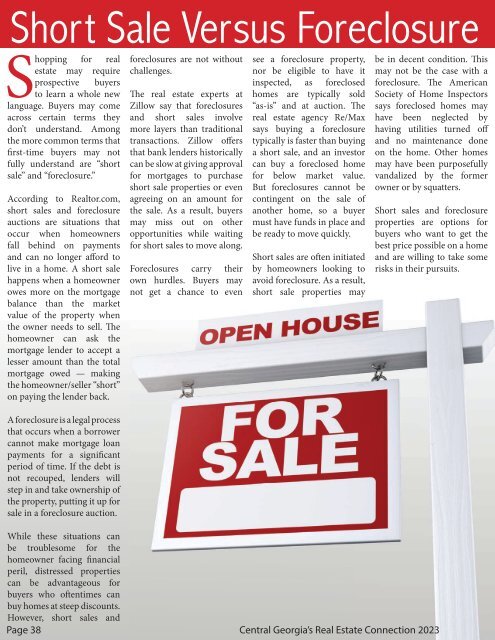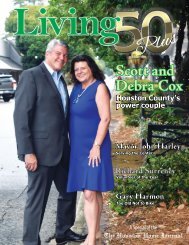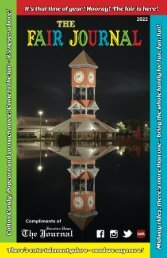2023 Central Georgia's Real Estate Connection
Create successful ePaper yourself
Turn your PDF publications into a flip-book with our unique Google optimized e-Paper software.
Short Sale Versus Foreclosure<br />
Shopping for real<br />
estate may require<br />
prospective buyers<br />
to learn a whole new<br />
language. Buyers may come<br />
across certain terms they<br />
don’t understand. Among<br />
the more common terms that<br />
first-time buyers may not<br />
fully understand are “short<br />
sale” and “foreclosure.”<br />
According to <strong>Real</strong>tor.com,<br />
short sales and foreclosure<br />
auctions are situations that<br />
occur when homeowners<br />
fall behind on payments<br />
and can no longer afford to<br />
live in a home. A short sale<br />
happens when a homeowner<br />
owes more on the mortgage<br />
balance than the market<br />
value of the property when<br />
the owner needs to sell. The<br />
homeowner can ask the<br />
mortgage lender to accept a<br />
lesser amount than the total<br />
mortgage owed — making<br />
the homeowner/seller “short”<br />
on paying the lender back.<br />
foreclosures are not without<br />
challenges.<br />
The real estate experts at<br />
Zillow say that foreclosures<br />
and short sales involve<br />
more layers than traditional<br />
transactions. Zillow offers<br />
that bank lenders historically<br />
can be slow at giving approval<br />
for mortgages to purchase<br />
short sale properties or even<br />
agreeing on an amount for<br />
the sale. As a result, buyers<br />
may miss out on other<br />
opportunities while waiting<br />
for short sales to move along.<br />
Foreclosures carry their<br />
own hurdles. Buyers may<br />
not get a chance to even<br />
see a foreclosure property,<br />
nor be eligible to have it<br />
inspected, as foreclosed<br />
homes are typically sold<br />
“as-is” and at auction. The<br />
real estate agency Re/Max<br />
says buying a foreclosure<br />
typically is faster than buying<br />
a short sale, and an investor<br />
can buy a foreclosed home<br />
for below market value.<br />
But foreclosures cannot be<br />
contingent on the sale of<br />
another home, so a buyer<br />
must have funds in place and<br />
be ready to move quickly.<br />
Short sales are often initiated<br />
by homeowners looking to<br />
avoid foreclosure. As a result,<br />
short sale properties may<br />
be in decent condition. This<br />
may not be the case with a<br />
foreclosure. The American<br />
Society of Home Inspectors<br />
says foreclosed homes may<br />
have been neglected by<br />
having utilities turned off<br />
and no maintenance done<br />
on the home. Other homes<br />
may have been purposefully<br />
vandalized by the former<br />
owner or by squatters.<br />
Short sales and foreclosure<br />
properties are options for<br />
buyers who want to get the<br />
best price possible on a home<br />
and are willing to take some<br />
risks in their pursuits.<br />
A foreclosure is a legal process<br />
that occurs when a borrower<br />
cannot make mortgage loan<br />
payments for a significant<br />
period of time. If the debt is<br />
not recouped, lenders will<br />
step in and take ownership of<br />
the property, putting it up for<br />
sale in a foreclosure auction.<br />
While these situations can<br />
be troublesome for the<br />
homeowner facing financial<br />
peril, distressed properties<br />
can be advantageous for<br />
buyers who oftentimes can<br />
buy homes at steep discounts.<br />
However, short sales and
















